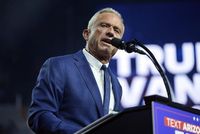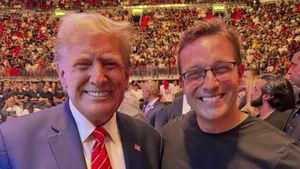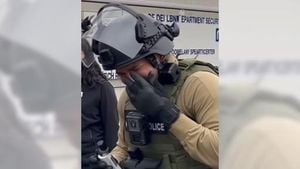The United States finds itself at the center of a heated debate over vaccine policy after Health Secretary Robert F. Kennedy Jr. abruptly canceled $500 million in federal contracts for mRNA-based vaccine research. The move, announced on August 5, 2025, has sent shockwaves through the scientific community and drawn sharp criticism from health experts and international organizations alike, according to reporting from the Associated Press, AFP, and Le Monde.
Kennedy, a figure long associated with vaccine skepticism, justified the sweeping decision by citing claims that mRNA vaccines are ineffective against upper respiratory infections like COVID-19 and flu, and that the technology itself poses more risks than benefits. In a video posted on X, Kennedy asserted, "As the pandemic showed us, mRNA vaccines don’t perform well against viruses that infect the upper respiratory tract." He went further, stating that "mRNA technology poses more risks than benefits for these respiratory viruses."
But these statements have been quickly and forcefully disputed by scientific authorities. Stephen Evans, a professor at the London School of Hygiene and Tropical Medicine, told the Science Media Centre, "Kennedy is mistaken in statements made when ceasing funding for mRNA vaccine development. No vaccine, including mRNA, encourages new mutations." Charles Bangham, professor of immunology at Imperial College London, added, "No vaccine has a zero incidence of side-effects, some of which can be serious, but the benefits of both mRNA vaccines and other types of vaccine – lives saved and illness reduced – hugely outweigh the risks."
Experts explain that Kennedy’s claims misrepresent how vaccines, especially those using mRNA technology, actually work. As Dr. Jake Scott, an infectious diseases physician at Stanford University, explained to the Associated Press, "A vaccine cannot block a respiratory infection. That’s never been the standard for a respiratory virus vaccine. And it’s never been the expectation, and it’s never been that realistic." Instead, mRNA vaccines are designed to prevent severe illness and death, even if they cannot fully prevent infection. Jeff Coller, a professor of RNA biology at Johns Hopkins University, emphasized, "Vaccinations don’t have to be neutralizing, meaning that you’re not going to get COVID. But the important part of a vaccination is that they reduce hospitalization and death. And a reduction in hospitalization and death is proof of an effective vaccine."
The effectiveness of mRNA vaccines is backed by a substantial body of research. According to a 2024 World Health Organization study, COVID-19 vaccines reduced deaths in Europe by at least 57%, saving more than 1.4 million lives since their introduction in December 2020. Another study published in Lancet Infectious Diseases in 2022 estimated that nearly 20 million lives were saved globally by COVID-19 vaccines in their first year. In the United States alone, the study estimated 1.9 million lives saved, and 4.2 million in India. Furthermore, a 2022 report in The New England Journal of Medicine found that two mRNA vaccines were more than 90% effective against COVID-19.
Despite these achievements, Kennedy’s decision marks a dramatic reversal from previous U.S. policy. During the final days of his first term, former President Donald Trump lauded the rapid development of mRNA vaccines as a "modern-day miracle," and Operation Warp Speed, launched under his administration, was credited with facilitating their swift rollout. Now, Kennedy’s move to terminate funding for projects backed by the Biomedical Advanced Research and Development Authority (BARDA) is being described as a full-scale attack on mRNA technology, even as promising research continues for other diseases.
International and domestic reactions have been swift and critical. On August 7, Joachim Hombach, a leading immunization official at the World Health Organization, called the U.S. decision a "significant blow" to vaccine science. "mRNA vaccines are a very important technology and platform which has served us extremely well for COVID. We also know there is very promising work going on in relation to influenza vaccines," Hombach said. Andrew Pekosz, professor of molecular microbiology and immunology at Johns Hopkins Bloomberg School of Public Health, warned on X that the funding cuts could "set back vaccine science by a decade." He added, "Of course they didn’t read the science or listen to the experts… if they did, they wouldn’t have made this decision."
Kennedy’s overhaul of U.S. health policy extends beyond just the cancellation of mRNA vaccine contracts. Since taking office, he has dismissed a panel of vaccine experts that previously advised the government, replacing them with his own appointees. In their first meeting, the new panel voted to ban a longstanding vaccine preservative that has been a target of anti-vaccine activists, despite its strong safety record according to mainstream medical authorities. Kennedy has also ordered a sweeping new study into the long-debunked link between vaccines and autism, a move that many scientists see as lending credibility to misinformation.
To understand the science at the heart of the controversy, it helps to know how mRNA vaccines work. Traditional vaccines often require growing viruses or viral proteins in the lab, a process that can take years. By contrast, mRNA vaccines use a snippet of genetic code to instruct the body to make a harmless piece of the virus, prompting the immune system to recognize and fight the real thing if it ever appears. This technology not only sped up the development of COVID-19 vaccines but also allows for rapid updates if new variants arise. The scientists whose discoveries made mRNA vaccines possible were awarded the Nobel Prize in 2023, underscoring the significance of their breakthrough.
Still, some Americans remain wary of the technology, and Kennedy has spent two decades amplifying those concerns. His latest actions appear to embed vaccine skepticism into the core of U.S. health policy. Critics argue that such a stance not only undermines public confidence but also threatens future innovations in vaccine development for a range of diseases, from influenza to emerging pandemics.
While the Department of Health and Human Services did not immediately respond to requests for comment, the implications of Kennedy’s decision are already being felt. Vaccine researchers warn that the loss of federal funding could stall or even halt critical projects, potentially leaving the U.S. and the world less prepared for future outbreaks. As Jeff Coller put it, "Why is Trump allowing RFK to undermine U.S. leadership in biomedical research and drug development?"
With the world still grappling with the aftermath of the COVID-19 pandemic, the U.S. government’s abrupt shift on mRNA vaccine research has left many in the scientific community and beyond questioning the future of public health preparedness. The debate over the role of vaccines, the interpretation of evidence, and the direction of health policy is far from over, but one thing is clear: the stakes, both scientific and societal, have rarely been higher.




